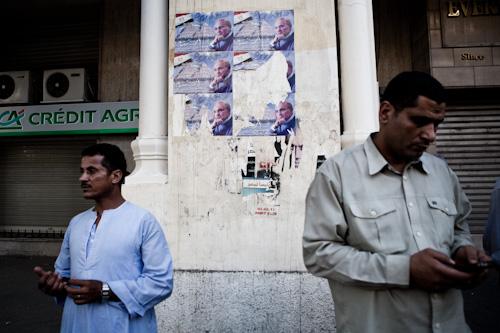 Taxi driver Khaled Morsy has been crying since he heard Saturday morning that former President Hosni Mubarak and his interior minister Habib al-Adly were sentenced to life in prison, while Mubarak's two sons and six interior ministry officials were acquitted. Hiding behind dark glasses, Morsy has more questions than answers.
Taxi driver Khaled Morsy has been crying since he heard Saturday morning that former President Hosni Mubarak and his interior minister Habib al-Adly were sentenced to life in prison, while Mubarak's two sons and six interior ministry officials were acquitted. Hiding behind dark glasses, Morsy has more questions than answers.
"When will we find justice in this country? When will we feel that this is our country?" he asks.
Morsy says that he has acquired a sense of belonging and ownership in Egypt for the first time when the people took to the streets in 2011 to protest against Mubarak’s regime. But like many others, he considers the verdict a mark of failure for the revolution that started then.
"We're seeing injustice everywhere around us and no one cares for us. Did the injustice prove to be stronger than we are?" he asks, having decided not to join protests in Tahrir Square after they proved futile in recent months.
The verdict has caused dissatisfaction and angry reactions in the Egyptian street, where protesters are denouncing the acquittals and deeming Adly and Mubarak's verdicts as insufficient. The people are not only upset that the ruling hasn't delivered justice but also afraid that it could pave the way for Mubarak's regime to return in full force.
Sherine Ibrahim, an accountant, plans to go to Tahrir Square after work to protest the verdict that she says has caused her blood to boil.
"Twenty five years? How about the people who died? The least we can accept is a death sentence. If I were a martyr's mother I would have gone and torn them apart with my bear hands," she says.
"We haven't made a revolution. We've been living in a play and that's why we'll go to the street again," she adds.
The verdict is considered to be the second strong blow to the revolution over the course of two weeks. The first was the qualification of Mubarak's last Prime Minister Ahmed Shafiq to enter the presidential election runoff against the Muslim Brotherhood’s candidate Mohamed Morsy. Many see both events as related signs of the return of the old regime.
"If Shafiq is elected, he will release [Mubarak and Adly] on medical grounds. I was undecided but now I'll vote to Morsy, not because I like him but because I'm afraid of what Shafiq would do," says Ashraf Salem, a business owner.
Objections voiced throughout the trial have resurfaced on Cairo’s streets. Many think that the ruling is due to the limited crimes charged against Mubarak and his regime figures, charges that don’t match the crimes of the regime over 30 years.
"It's disappointing that someone like Gamal Mubarak, who is the reason for the downfall of the whole country, is being tried for a villa in Sharm El Sheikh. It's hard to imagine that in a few years he could be out of prison and doing business again," says Mohamed Abdel Baqy, a 50-year-old chemist.
Gamal and his entourage of businessmen and politicians are seen as the orchestrators of the political and financial corruption in the last decade.
Just a few days ahead of the verdict, Mubarak's sons were charged of manipulating the stock market, a move many see as an attempt to absorb the anger over their impending acquittal.
Many say that justice would have been achieved only if the regime figures were tried in a special, revolutionary court rather than an ordinary criminal court.
"They tailored the laws to cover up on their crimes. We won't be able to prove anything on them by law," says Abdel Baqy.
Many saw the verdict as irrational. The conviction of Mubarak and Adly, while Adly's deputies, who were part of the same crime and were acquitted, raised concerns that the convicts can easily be acquitted through appeals.
"They are treating people like fools. It's not like Adly went down to the street and killed people himself," says accountant Fatma Hassan.
With all the defendants in both cases related to financial corruption acquitted, many say that they haven't gotten what they wanted most out of the trial: Egypt's stolen money back.
"Since they are already out of the political system, what good does their imprisonment do to us? But it's over now. We won't get the money back," says Mai Mahran, a recent graduate from the faculty of tourism.
With senior Ministry of Interior figures released, people are scared that they might return to their posts, and to their oppressive practices, with a vengeance.
"If they haven't killed the people, then who did?" asks Mohamed Shahin, a vendor. "That [former First Assistant Interior Minister for the State Security Agency] Hassan Abdelrahman should have never been out. He'll be back to work and he will take revenge of anyone who opposed the regime in this past period," he adds.
These fears are not too far-fetched. Omar al-Faramawy, former head of the 6th of October Security Directorate, told Al-Masry Al-Youm hours after his acquittal that he intends to sue the Ministry of Interior to be reinstated.



